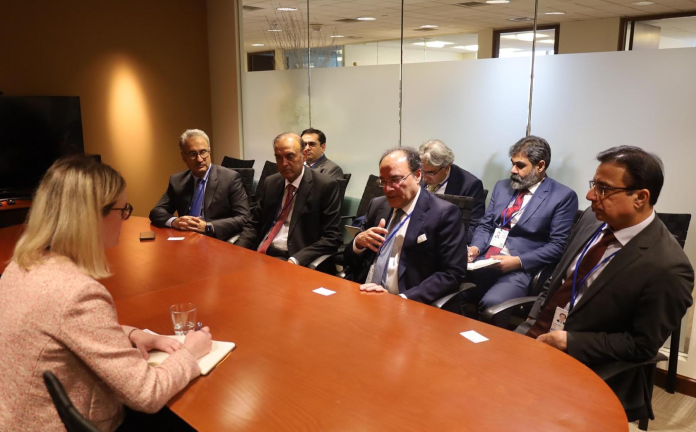WASHINGTON D.C: APR 23 (DNA):Finance Minister Senator Muhammad Aurangzeb engaged in a series of high-level meetings on the second day of his visit to Washington, D.C., for the annual spring meetings of the International Monetary Fund (IMF) and the World Bank, focusing on Pakistan’s economic stability, ongoing reforms, and investment opportunities. Minister Aurangzeb began his day by participating in the G-24 Finance Ministers and Central Bank Governors’ Meeting.
As the Second Vice Chair of the G-24, he delivered a statement highlighting Pakistan’s macroeconomic stability, achieved through resilient banking systems and sustained structural reforms. He emphasized the need to stay the course on reforms amidst global economic challenges, including geopolitical dynamics, trade fragmentation, and protectionism. Additionally, he underscored the importance of regional corridors, trade connectivity, and South-South collaboration to enhance investment and trade flows. During an IMF-hosted panel discussion titled “Revenue Mobilization in the Medium Term,” the finance minister outlined Pakistan’s efforts to broaden and deepen the tax base to ensure that sectors like agriculture, real estate, and retail contribute proportionally to GDP.
“These strategies include enhancing contributions from key economic sectors, transforming the Federal Board of Revenue (FBR) through technological advancements and process improvements, minimizing taxpayer-collector interface, strengthening enforcement and compliance, and utilizing AI for customized audits,” said the finance minister. Later, Minister Aurangzeb participated in a fireside chat at the Atlantic Council’s GeoEconomics Center, addressing “Challenges and Opportunities for the Pakistani Economy through 2025 and Beyond.”
He outlined the government’s reform agenda, which includes digitalization of FBR, enhanced provincial involvement in the tax collection, and provinces’ legislation on the Agriculture Income Tax. “Through ongoing efforts to rationalize federal spending and collaborate with provinces under a National Fiscal Pact, we’re building sustainable economic foundations,” added the Minister.
The finance minister also addressed climate and population challenges, highlighting the World Bank’s 10-year Country Partnership Framework (CPF) for Pakistan. The Minister affirmed the government’s commitment to launching the Panda Bond and appreciated multilateral institutions’ efforts in ensuring better coordination on risk analysis and due diligence. “We are finalizing a green taxonomy framework through the State Bank, paving the way for innovative instruments such as green bonds, green sukuks, and the country’s inaugural Panda bond, proceeds of which will be linked to SDG-aligned projects,” said Senator Aurangzeb.
Expressing the government’s desire for improved trade relations with the U.S., Mr. Aurangzeb emphasized plans for constructive engagement with the U.S. to address trade imbalances, with a high-level delegation expected to visit soon. In a meeting with institutional investors, Minister Aurangzeb provided updates on Pakistan’s economic outlook, fiscal and monetary developments, and reform progress. He highlighted the country’s macroeconomic stabilization and the recent credit rating upgrade by Fitch, which has opened avenues for Pakistan’s return to financial markets through enhanced investor confidence. The finance minister also met with Mr. Martin Raiser, the World Bank’s Vice President for South Asia, where he expressed gratitude for the approval of the 10-year CPF.
They discussed accelerated operationalization of the CPF, need for increased private sector investment, and importance of addressing project implementation bottlenecks. Furthermore, Minister Aurangzeb held a meeting with the Deutsche Bank team, led by Ms. Myriam Ouazzani, Managing Director for the MENA region.
He expressed Pakistan’s interest in returning to financial markets, including the issuance of Panda and ESG bonds, based on the country’s improved macroeconomic stability and credit ratings. Separately, during talks with Moody’s commercial team, the finance minister briefed them on Pakistan’s fiscal and current account surpluses, declining inflation, stable exchange rates, and foreign reserves. Discussions also covered the Panda Bond initiative, with both sides agreeing to explore future collaboration. In an important and productive meeting with H.E. Sultan bin Abdulrahman Al-Murshid, CEO of the Saudi Fund for Development (SFD), Finance Minister Aurangzeb recalled his visit to Saudi Arabia for the Al-ula Conference on Emerging Markets and his meeting with the Saudi Finance Minister.
He briefed H.E. Al-Murshid on Pakistan’s improving macroeconomic indicators, including the recent credit rating upgrade by Moody’s. Expressing appreciation for the G2G and B2B interest in investment projects in Pakistan, Minister Aurangzeb requested the expedited disbursement of funds under the Saudi Oil Facility, assuring prompt submission of oil shipment documentation. Both sides reviewed the existing portfolio, expressing satisfaction over the progress, with the finance minister seeking financial support from SFD for the N-25 project.

















